|
|
|
Sort Order |
|
|
|
Items / Page
|
|
|
|
|
|
|
| Srl | Item |
| 1 |
ID:
170175
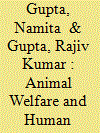

|
|
|
|
|
| Summary/Abstract |
India’s large stray dog population, estimated to be about 25 million, poses substantial risks to human health, motivating some civic bodies to employ cruel methods to control dog populations. This article argues that while human health is certainly a priority, it is also important to consider animal welfare and to handle dog population control measures without causing unnecessary animal suffering. Triangulating the issues of rabies control, dog population management and state intervention, the article identifies recent practical difficulties in local management of dog population control laws and policies in India’s model city of Chandigarh. Based on a survey of local opinions, this shows how rising human–animal conflicts require new ways of handling existing challenges.
|
|
|
|
|
|
|
|
|
|
|
|
|
|
|
|
| 2 |
ID:
146636
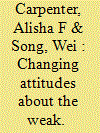

|
|
|
|
|
| Summary/Abstract |
The foundation of current legal protection for animals in China is based on the principle of “rational utilization.” This utilitarian attitude supports the exploitation of animals through the legal means of resource management. However, through a process of public education and the construction of recent legislation, attitudes toward animals are rapidly changing in China. After the introduction of the concept of animal welfare in China in 1989, preliminary socioeconomic events such as early laboratory animal science, animal cruelty reports, pet ownership, engagement in international trade, and the severe acute respiratory syndrom (SARS) epidemic helped spur a trend away from a purely utilitarian attitude toward more positive associations with animals among members of the Chinese public. This phenomenon will be analyzed through the actions of non-governmental organizations, the media, academia, and international business to influence education and the development of legislation to promote animal protection practices. In addition, recent events will be used to illustrate political realities in China that impede the full promotion of animal welfare protection.
|
|
|
|
|
|
|
|
|
|
|
|
|
|
|
|
| 3 |
ID:
110929
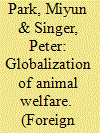

|
|
|
|
|
| Publication |
2012.
|
| Summary/Abstract |
The Universal Declaration of Human Rights, adopted in 1948, articulates the idea that it is wrong to exclude any member of the human species from the circle of moral concern. This enlightened vision was a tremendous advance over earlier, more restricted views about who matters morally; yet it still excludes a far larger number of beings who can both enjoy life and suffer: nonhuman animals. They, or at least those capable of feeling pain, which at a minimum includes all vertebrates, are also entitled to concern. Pain is pain, irrespective of the species of the being that experiences it.
|
|
|
|
|
|
|
|
|
|
|
|
|
|
|
|
| 4 |
ID:
178162
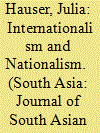

|
|
|
|
|
| Summary/Abstract |
Analysing Indian protagonists’ strategies at the 15th World Vegetarian Congress in India in 1957, this article argues that they brought together Hindu nationalism and internationalism. By constructing non-violence and vegetarianism as a national heritage, they characterised India as a moral superpower above the divisions of the Cold War and endowed it with a global civilising mission. On the other hand, they tried to win international support to influence the politics of the Indian government, opposing parts of the Five-Year Plans and Nehru’s politics of secularism. Moreover, by insisting on India as a vegetarian country, they erased Islam from Indian history.
|
|
|
|
|
|
|
|
|
|
|
|
|
|
|
|
| 5 |
ID:
139344
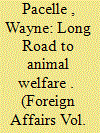

|
|
|
|
|
| Summary/Abstract |
On election night in November 1992, I waited anxiously with other animal welfare activists at the Radisson Hotel in Denver, Colorado, to learn the outcome of a statewide ballot measure to ban the baiting, hound hunting, and spring hunting of black bears. The initiative was a big deal both for me (it had been my idea) and for the animal welfare movement more generally. Colorado was a political redoubt for the National Rifle Association and other pro-hunting groups; if the ballot measure passed, it might inspire other reforms for animals, and if it failed, it might set the movement back years. Most of my fellow activists had been skeptical about the initiative, arguing that it was a fool’s errand because the hunting lobby was too strong to defeat. But the leaders of the Humane Society of the United States (HSUS—then as now, the largest animal protection organization in the country—had overruled their political staff and decided to support the effort, on principle. “It’s too important not to try,” John Hoyt, then the group’s president, told me. “If we lose, I want to be on the side of the losers.” In the end, we won big, getting 70 percent of the vote.
|
|
|
|
|
|
|
|
|
|
|
|
|
|
|
|
| 6 |
ID:
143380


|
|
|
|
|
| Summary/Abstract |
In the wake of the supermarket revolution, consumer concerns over food safety in China have resulted in an accelerated change towards the procurement of food products from modern retail channels. We employ discrete choice experiments to assess consumer preferences for food quality attributes across various retail channels using primary data from Beijing, China. Results suggest that consumer willingness to pay for food safety is retail channel invariant, while preferences for organic and Green Food certification are product and retail channel specific. We find evidence of emerging consumer preferences for animal welfare attributes. Implications for food retail managers and agribusinesses are discussed.
|
|
|
|
|
|
|
|
|
|
|
|
|
|
|
|
| 7 |
ID:
178630
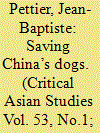

|
|
|
|
|
| Summary/Abstract |
To be considered worthy of society’s protection is not the objective consequence of an inherent quality but the result of a social process. This article examines this observation through the case of canine welfare in China. Popular defense of dogs against brutalization and consumption, as well as state regulations, have become common in China in recent years, generating conflicts over the value attributed to dogs. To understand the circumstances behind and broader implications of activists’ support for protecting dogs, this article identifies elements that are determinant: framing; prioritization; the relationship between protectors and protected; and the socio-political background of these campaigns.
|
|
|
|
|
|
|
|
|
|
|
|
|
|
|
|
| 8 |
ID:
169137
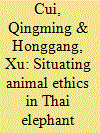

|
|
|
|
|
| Summary/Abstract |
Following ethical contextualism, this article situates different animal ethical principles, from anthropocentrism to non‐anthropocentrism and relational caring ethics, in Thai social contexts in order to examine whether these principles can lead to a sustainable ethical practice in elephant conservation. The results show that, as non‐anthropocentrism, animal rights ethics are impractical in Thailand because of temporal, spatial, economic and social constraints. As weak anthropocentrism, animal welfare ethics endorse the tourism industry to commercialise the encounter value of elephants by developing elephant camps. Along with animal welfare, relational ecofeminism justifies the emerging model of elephant sanctuaries. Both camp and sanctuary models create a work‐for‐care cycle, in which elephants work to generate economic gains, some of which are in turn used to care for elephants. However, because of evolving social situations, such as potential market competition and poaching of wild elephants, the morality of the work‐for‐care cycle is weak and can be challenged. Nevertheless, sanctuaries offer a direction for a local solution because of their potentially responsible business model. In conclusion, there is not a single set of ethics that can solve all problems and be sustainable in all contexts.
|
|
|
|
|
|
|
|
|
|
|
|
|
|
|
|
|
|
|
|
|